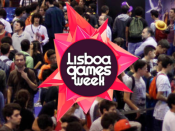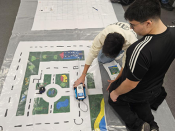Cristophe Cruz and Muhammad Arslan (University of Bourgogne).
Abstract: The technological advancements in mobile computing coupled with location-based services provide tremendous opportunities to capture different behaviours of moving and changing objects for pattern mining and activity recognition. These behaviours are extracted after processing raw spatio-temporal streams having location information with timestamps collected from indoor and outdoor positioning devices. Based on the application requirements, these raw streams are transformed into finite meaningful episodes known as trajectories. While the information from raw trajectories is useful to understand movement dynamics of objects, it does not provide the contextual semantic information which is required to understand meanings behind each trajectory episodes. In order to address this challenge and to understand fine-grained objects` interactions with its dynamic environment, Semantic Trajectories in Dynamic Environments named STriDE model is suggested to semantically enrich raw trajectories. The ontology-based STriDE model receives tracking results of moving objects by combining raw data pre-processing and semantic definition of the environment (e.g. BIM). The STriDE model takes advantage of GeoSPARQL spatial capabilities as well as methods proposed in ontologies fluent to represent the evolution of objects in the dynamic environment. Once the semantic enrichment process is done on the raw trajectory data using the STriDE model based on semantic data sources including application domain knowledge and geographic databases, it offers many applications for monitoring and managing dynamic environments. However, this talk will discuss two of them:
- Intrusions are the common type of near-miss incidents caused by unsafe worker behaviours such as taking shortcuts on sites to move around without recognizing the potential risks associated with the locations. These incidents can lead to serious accidents such as falling from heights, exposure to hazardous materials, and striking against or being struck by moving objects. In an attempt to identify intrusions, worker trajectory data is enriched using the STriDE model and stored in the triple store. The developed system will not only serve as a central data repository to store users` trajectories taken place on the construction site for movement related behaviour analysis but can also help building supervisors and H&S manager to manage access control of workers to hazardous locations and enabling them to identify intrusions. On the occurrence of an intrusion, an intruder can be recognized easily from its trajectory`s identification and necessary actions can be performed proactively to avoid unsafe situations in the building;
- The second application apply probabilistic method i.e. Hidden Markov Models (HMMs) on semantic trajectories resulted from the STriDE model to categorize the trajectory data for identifying unsafe worker`s movements on construction sites. As, mobility of a moving object can easily be defined using individual steps and turning angles. Based on these two parameters, hidden states are defined for HMMs. Using the Viterbi algorithm, the trajectory data of workers is categorized into static (no change in steps or angles), normal (safe walking speed and rotations), and risky (running and big rotations) states. Visualizing such mobility patterns in real-time will help H&S managers in monitoring and controlling site activities by identifying high-risk worker`s behaviours.
Short Bio:
- Christophe Cruz is an Associate Professor at the laboratory Le2i in the University of Bourgogne, and Vice-President in charge of Digital Policy and Information Systems of the University UBFC (Université Bourgogne-Franche-Comté). He leads the cluster team ‘Smart Environment’ of the laboratory Le2i. Previously, he was a postdoctoral fellow at the i3mainz - Institute for Spatial Information and Surveying Technology working with Prof. Dr.-Ing. Frank Boochs. Christophe Cruz obtained a Ph.D. in Computer Science at the University of Bourgogne, Dijon, France;
- Muhammad Arslan is working as a Researcher at the laboratory Le2i in the University of Bourgogne. Prior to that, he was working as a Senior Officer in IT - Business Intelligence department at China Mobile Pakistan (CMPAK). Moreover, he has done his Master`s degree in Information Technology from National University of Science and Technology (NUST), Islamabad. His main research focus towards developing Health and Safety (H&S) management solutions for monitoring construction sites using real-time sensory data.






















